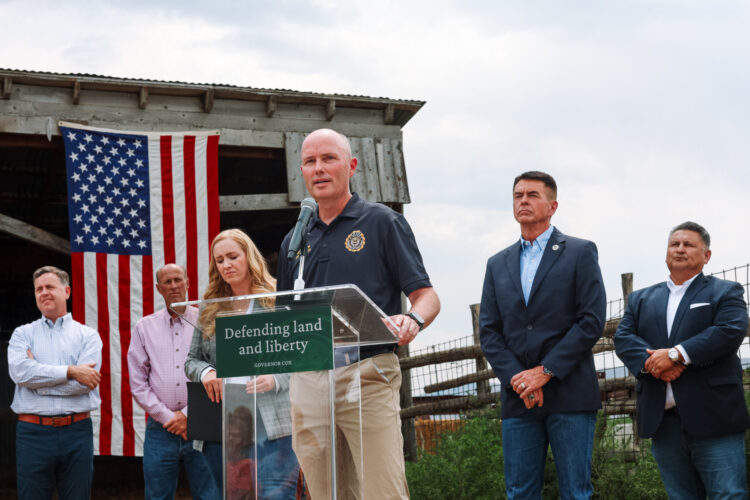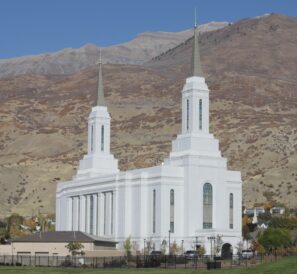A Chinese-owned company tried to buy land near Provo Airport. Utah blocked it, Gov. Cox says

Courtesy of the Utah Governor’s Office
Utah Gov. Spencer Cox announces Utah officials had blocked an attempted land purchase by a Chinese-owned company of land near the Provo Airport during a news conference at a family-owned farm in Palmyra on July 15, 2025.Utah Gov. Spencer Cox and several lawmakers gathered in a sweltering field next to an old barn in the tiny farm community of Palmyra on Tuesday to announce state officials had recently blocked a Chinese state-owned company from buying land near the Provo Airport.
Cox said he wanted to make clear that “Utah is reaffirming a strong message that it’s been sending for years.”
“We will not allow adversarial foreign entities to buy up strategic land in our state,” Cox said.
He announced that “a Chinese state-owned company, tied to the People’s Liberation Army,” which is the military arm of the Chinese Communist Party “tried to purchase land near the Provo Airport very recently.”
Cox described the company, Cirrus Aircraft, as “majority-owned by the Avian Industry Corporation of China, also known as AVIC.”
“A restricted foreign entity under Utah law with deep military ties to the Chinese government, AVIC makes fighter jets, helicopters and drones for the Chinese military,” he said. “They appear on multiple U.S. federal watch lists and are banned from federal contracts, assistance and benefits due to serious national security concerns.”
Cirrus Aircraft, which sells private planes, began as a U.S. company based in Wisconsin, according to its website. In 2011, when many U.S. companies were struggling in the wake of the Great Recession, AVIC’s subsidiary China Aviation Industry General Aircraft bought Cirrus for about $210 million, Bloomberg reported in 2023.
“Cirrus isn’t a military manufacturer — its main products are single-engine planes used by private citizens and charter services — but some of its technology and manufacturing expertise could be valuable to the (People’s Liberation Army),” Bloomberg reported in that 2023 article, attributing “several aviation and Chinese military experts interviewed by Bloomberg.”
That story also noted Cirrus “hasn’t been accused of any wrongdoing … but its parent company is under a great deal of scrutiny,” noting that in 2020 the U.S. began “flagging AVIC as a potential national security threat, imposing sanctions designed to hinder the growth of companies directly connected to China’s military.”
Cox’s office did not offer many details about what Cirrus had planned to do with the land near the Provo Airport, but the governor said “their proposed investment in Utah was millions of dollars and hundreds of jobs.”
“And I don’t care,” Cox said. “We are not for sale.”
The governor applauded the Utah Legislature for passing several laws meant to clamp down on “foreign threats” in the state, including HB516, a bill sponsored by Rep. Candice Pierucci, R-Herriman, passed in 2024 that restricts companies controlled by countries including China, Iran, North Korea and Russia from buying land in Utah. It also requires land already owned by those countries to be divested.
In 2022, Utah universities also began shutting down Confucius institutes after Utah lawmakers raised national security concerns. Pierucci said they were “identified by the State Department and FBI as Chinese propaganda outlets.”
The blocked land purchase near Provo Airport
The governor’s office referred questions about the blocked land sale to the Department of Public Safety, which lawmakers tasked with maintaining a list of “restricted foreign entities,” creating a process for flagging land purchases by restricted countries, investigating purchases, and training local officials like county recorders to report land conveyances they suspect are prohibited.
Capt. Tanner Jensen, director of Utah Department of Public Safety’s statewide information and analysis center, told Utah News Dispatch on Tuesday evening that public safety officials were notified of the attempted purchase earlier this year, in February and March, and “efforts were immediately stopped.”
Jensen said under state law, county recorders are required to notify the Department of Public Safety of “any suspicious activity surrounding foreign land purchase conducted by restricted entities.” In the case of the attempted Cirrus purchase, “the county recorders and the Governor’s Office of Economic Opportunity notified DPS,” he said.
Jensen said he was not immediately able to provide more information, including how many acres were set to be sold, where specifically the land was located in relation to the Provo Airport, and who was selling the land.
But he said the potential purchase in proximity of the Provo Airport was concerning because it could have been “strategic, economically” for the Chinese government, “and also strategic in the fact that aviation is a critical infrastructure.”
“Our federal, state, local law enforcement and homeland security efforts are focused on this type of activity, especially from China and some other nation state actors that are looking to compromise our freedoms and our security here,” Jensen said. “Land purchase is just one of many tactics that we’re concerned about.”
He added that public safety officials are also concerned about “surveillance, security compromises, intellectual property theft, (and) attacks on our democratic process by misinformation.”
“So this foreign land purchase is just one aspect of it,” he said. “But we do know that it’s a tactic that they use to gain control of our economy, to have influence over how our economy functions, and also gives foreign adversaries the ability to collect additional information on our security efforts here.”
To Pierucci, the blocked sale showed Utah laws are working.
“What was exciting about this stop of the transaction next to the Provo Airport was it was a county recorder who caught it, and it was because of the training, a direct result of the legislation that was passed and signed by Gov. Cox,” Pierucci said.
Susan Sorensen, owner of the fifth-generation family farm in Palmyra, said she offered to host Tuesday’s press conference when she learned the governor’s office was looking for a location. She told Utah News Dispatch she’s never experienced a foreign entity attempting to purchase her land, but she knows first-hand how difficult it can be for small Utah farm owners to keep their land in their family.
“It’s extremely important that we protect our farmland,” she said.
How much land in Utah is owned by China?
Currently, Cox said it’s “very, very little.”
He said he wanted to set the record straight, noting that there have been some “really dumb maps that keep floating around the internet” that incorrectly showed “millions of acres of Utah” are owned by the Chinese government.
According to data recently released by the U.S. The Department of Agriculture, as of Dec. 31, 2023, about 33,000 acres in Utah had been owned by Chinese companies and investors, The Center Square reported.
Cox said “there are lots of different efforts, including here in Utah,” to categorize land owners and ensure “we don’t have those adversarial entities.” By most estimates, he said around 35,000 to 37,000 acres of land in Utah were owned by the Chinese government.
He emphasized the words “were owned.”
“Over the past few months, 35,000 acres of that has been divested and is no longer owned by the Chinese government,” he said. “So now we’re talking about a very, very, very small percentage. We will continue to investigate and we will continue to make sure that we are enforcing the law.”
Cox said Tuesday’s press conference “isn’t just about one deal.”
“It’s about protecting strategic land and ensuring foreign adversaries cannot gain a foothold in our state,” he said. “Other states might have let this slip through the cracks. Utah didn’t, and won’t.”
As of the end of 2023, U.S. Department of Agriculture data showed about 45.8 million acres in the U.S. — a swath of land that, taken all together, would be larger than Washington state — belonged to foreign entities, The Center Square reported. It’s unclear where that figure stands today.
According to the governor’s office, other states are interested in Utah’s policies, which have also been “recognized as a national best practice by senior U.S. Department of Defense officials.” It also noted the Association of Defense Communities invited Utah to present at its national installations conference.
Pierucci said her slate of bills that have taken aim against the Chinese Communist Party’s influence “are far more than policy.”
“They are a declaration that Utah will not be intimidated or infiltrated by authoritarian regimes, and they affirm that we value freedom, transparency and security over short-term economic convenience,” she said.
Pierucci added that Utah’s efforts have “set an example nationally for how states can stand up to the Chinese Communist Party’s malign interests and safeguard our national security.”
“National security is no longer the exclusive domain of Washington. It begins here at home, on our farms, in our schools and universities, with county recorders, industry partners and policymakers,” she said. “So let us be clear-eyed and confident. We will not be intimidated by authoritarianism masquerading as progress.”
She also said there’s more to come from the Utah Legislature, including legislation to “address Utah’s water vulnerabilities” and “put a stop to the CCP’s forced disclosures of our critical minerals in order for our Utah ranchers to sell their products to them.” She said lawmakers will also look to enhance the Department of Public Safety’s “tools and resources” to enforce all of these measures.
It’s not just about land, Cox said, but also religious freedom
Near the end of Tuesday’s press conference, Cox ended his remarks by also pointing to recent actions by the Chinese government to restrict religious worship, including the closure of multiple congregations of The Church of Jesus Christ of Latter-day Saints in Beijing.
“These weren’t radical or political gatherings,” he said. “They were peaceful, quiet places of worship, attended by Utahns, American diplomats, and local Chinese believers who followed the law and stayed out of the spotlight.”
The governor said “it’s clear what China is attempting to do here. They’re using the right to worship as leverage.”
“This is personal for us,” he continued, adding that “Utah’s own story is rooted in the right to worship. Religious liberty is not a bargaining chip. Not for land deals. Not for trade. And not for diplomacy.”
Utah, he said, will “always stand for the right to worship freely, and we reject any attempt — foreign or domestic — to silence that right through coercion or pressure.”
Cox said the shutdowns “reflect a growing pattern, not just against Latter-day Saints, but against many faiths and nonprofits with any ties to the West.”
“This is what authoritarianism looks like: pressure abroad, coercion at home, and total disregard for faith and belief,” Cox said. “And it’s why Utahns must remain vigilant. Whether it’s farmland near an airport or quiet congregations abroad, we will continue to stand for liberty, for property rights, for religious freedom, and for the values that make this state and this country great.”
Utah News Dispatch is part of States Newsroom, the nation’s largest state-focused nonprofit news organization.



